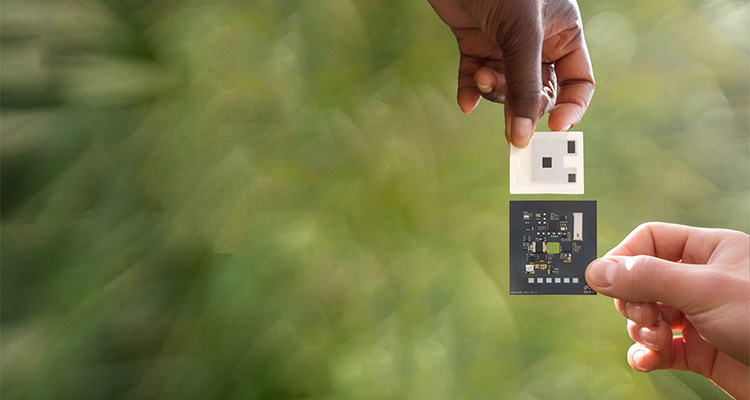
Meet BeFC, the scientists replacing lithium batteries with compostable paper strips
Established in May 2020 as a spin-off from the CNRS (French National Centre for Scientific Research), BeFC is built on decades of groundbreaking biofuel cell research, targeting emerging markets in packaging, wearables, and single-use medical applications. With an exceptional team of world-class engineers, scientists, and problem-solvers, BeFC is committed to developing organic and eco-friendly energy solutions for the next generation of smart and sustainable electronics. As a pioneer in biofuel cell technology, BeFC is transforming the production of batteries and electronics through a range of clean, sustainable products. These include natural, enzyme-driven battery alternatives and autonomous, eco-friendly data-capture tags and patches. Alexandre Cheikhi, Commercial Director, sheds light on the technology and innovation behind BeFC key products.
“As a French startup originating from the CNRS, our technology is rooted in over 20 years of pure research that took place before we even founded BeFC. The core concept driving our work is to mimic the chemical reactions that occur in every living organism to generate energy, specifically the reaction between enzymes, sugar, and oxygen. Initially, we aimed to harvest the enzymes, sugar, and oxygen directly from the organism but then switched to printing enzymes and sugar onto paper, resulting in the world’s first metal-free and compostable electricity source. Indeed, our product consists of a small piece of paper containing only enzymes and sugar, which produces energy for up to two weeks, a lifespan we are actively working to extend. At the moment, our technology is primarily focused on business-to-business (B2B) applications, such as powering small Internet of Things (IoT) devices in logistics and small medical devices. Our ultimate goal is to power various IoT devices while replacing traditional lithium, or zinc manganese batteries,” he informs.
Though still in its early years, BeFC’s game-changing biofuel cell is already applicable in a variety of fields, as Alexandre notes. “For now, IoT devices remain our primary market, encompassing everything from measuring and sending information to powering LED or screens. Our biofuel cells have many applications, including medical, logistics, agriculture, and waste management. They can even function as smart labels, such as a glowing label on a bottle of champagne if desired. Still, the range of applications is somewhat limited now, as our battery lasts only two weeks. In the future, we aspire to extend the battery life to several months, which would broaden the spectrum of applications and allow us to replace coin cell batteries in many scenarios. One example I particularly like is digital pregnancy tests that feature a small screen to indicate how far along the pregnancy is. These single-use tests are used for a limited time and then discarded along with their lithium batteries, which is harmful to the environment. The same battery that has been thrown away could have been used for three or four years more. Instead, our goal is to replace lithium batteries with a fully compostable solution that significantly reduces environmental impact,” he enlightens. 
In an exciting development, BeFC has recently signed brand deals with a major medical device company and a logistics firm. “Our deal in the logistics sector involves providing cold chain monitoring devices that measure temperature and humidity during vaccine transportation. It is essential to use our energy source rather than traditional options because many airlines are increasingly restricting the amount of lithium authorized in their airplanes. Thus, our small, label-like devices offer a safer and convenient alternative, as they can stick to any parcel and record temperature throughout transportation. Our biofuel cells compete with coin cell in terms of size, given that they are as thin as paper.
“In the medical sector, we have multiple confidential deals. For example, we signed a contract to create smart bandages that integrate energy and electronics to measure humidity, pH and other factors directly within the wound. This allows users to know when to change the bandage and if any issues arise. Additionally, our energy source is the safest option for this application, as lithium or zinc manganese can be dangerous near an open wound. Our idea is to develop a bandage that is almost the same as a standard one but incorporates an energy source and electronics. This concept can also be applied to lot of medical devices, making them smart,” Alexandre elaborates.
For the remainder of 2025, BeFC will focus on research and development to further enhance its biofuel cells and prolong their lifespan. “Our objective is to achieve at least one month of reliable performance by the end of this year,” Alexandre says. “Equally, we seek to improve the overall design of the product for easier integration; the thinner it is, the better. Nonetheless, extending lifespan remains our top priority. In less than six months, we have already doubled the lifespan of our biofuel cells, so we are just at the beginning of what we can achieve with this technology. Every day, we experiment with new enzymes, sugars, and other components, constantly learning and innovating. All in all, I am confident that we will make a significant breakthrough in the future regarding lifespan. If we can create a solution that lasts for years, we could replace lithium batteries in countless IoT devices,” he ends.
BeFC’s revolutionary biofuel cell technology, rooted in decades of innovative research, positions the company as a pioneer transforming the future of sustainable energy and electronics.